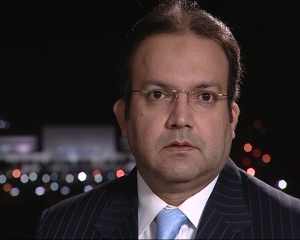ندیم ملک
ISLAMABAD
TONIGHT
 Islamabad Tonight »
Islamabad Tonight »
 Islamabad Tonight »
Islamabad Tonight »








ISLAMABAD TONIGHT
Islamabad Tonight 16th July 2009
Islamabad Tonight 1st July 2009 [Imran Khan]
Islamabad Tonight 24th June 2009
Islamabad Tonight 28th May 2009 [Dr AQ Khan]
Islamabad Tonight »
Islamabad Tonight »
Islamabad Tonight »
Dr. A Q Khan, Nuclear Scientist, Jamal Khan Leghari PML (Q) and Khuram Dastgir Khan of PML (N) disuss Pakistan at 62 and Political Realities with Nadeem Malik brings a new episode of Islamabad Tonight.
Islamabad Tonight »
Dr. Attiya Inayatullah PML (Q) MNA, Ghulam Farid Kathia PPP Minister and Iqbal Zafra Jhagra PML(N) Secretary General in fresh episode of Islamabad Tonight & discusses current issue with Nadeem Malik.
Islamabad Tonight »
Hanif Abbasi MNA PML (N), Samsam Bukhari PPP Information Minister, Ejaz Ul Haq PML (Q) discuss Role of the Parliament and political positions of PPP and PML (N) with Nadeem Malik with another episode of Islamabad Tonight.
Islamabad Tonight »
Mehreen Anwar Raja PPP Minister for Parliamentary Affairs, PML (Q) MNA Shaikh Waqas Akram, and MQM MNA Waseem Akhtar discuss Article 6 and Parliament.
Islamabad Tonight »
Enver Beg PPP, Kamran Shafi Columnist, Justice Wajihuddin Ahmed in a fresh episode of Islamabad Tonight.
Islamabad Tonight »
Anusha Rehman Khan PML (N), Nawab Yousaf Talpur PPP, Dr. Rasool Bakhsh Raees, Political Analyst, Barrister Saif Ali, Lawyer of Gen Musharraf in a fresh episode of Islamabad Tonight.
Islamabad Tonight »
Nadeem Malik brings a fresh episode of Islamabad Tonight discussing with guests Kashmala Tariq (PMLQ), Raja Zafrul Haq (PMLN), Hamid Nasir Chatha (PMLQ) and Hamid Saeed Kazmi (PPP).
Islamabad Tonight »
Nabeel Gabol PPP, Tariq Azeem PML-Q and Roedad Khan in fresh episode of Islamabad Tonight & discuss Supreme Court Order in a fresh episode of Islamabad Tonight.
Islamabad Tonight »
Sartaj Aziz PML (N) and Nazar Muhammad Gondal PPP Minister discuss Food Security in a fresh episode of Islamabad Tonight.
Islamabad Tonight »
Sheikh Rashid Ahmed, Nafees Siddiqi, Rehmat Ali Raazi on Accountability of Dictators and Constitutional Matters in a fresh episode of Islamabd Tonight with Nadeem Malik.
Islamabad Tonight »
Nadeem Malik presents a new episode of Islamabad Tonight discussing Mushrraf’s future with Jahangir Badar (PPP), Aasia Riaz (PILDAT) and Tehmina Doltana (PMLN).
Nadeem Malik with another interesting episode of Islamabad tonight. Senator Ishaq Dar PML-N and Senator Afrasiab Khan Khattak in fresh episode of Islamabad Tonight.
Islamabad Tonight »
Nadeem Malik brings a new episode of Islamabad Tonight discussing ongoing case in Suprem Court and its implications, possibilities of operation in Balochistan with analysts Haroon Rasheed, Orya Maqbool Jan, Babar Sattar (Lawyer) and Raja Pervaiz Ashraf (PPP).
Islamabad Tonight »
Watch fresh episode of Islamabad Tonight with Nadeem Malik. Akram Chaudhary, Wasi Zafar and Irfan Siddiqui in fresh episode of Islamabad Tonight.
Islamabad Tonight »
Nadeem Malik presents a very interesting episode of Islamabad Tonight discussing issues of bad governance and Balochistan situation with guests Tariq Ali (Analyst), Hasil bazanjo (BNP), Abdul Rahim MandoKhail (PKMAP) and Hafiz Hussain Ahmed (JUI-F).
Islamabad Tonight »
Nadeem Malik brings a new episode of Islamabad Tonight. Khurshid Shah PPP, Khawaja Asif PML (N), Pervez Rashid and Saleem Bokhari, senior journalist in Islamabad Tonight discuss 17th Amendment.
Islamabad Tonight »
Akram Zaki, Gen. (R) Hameed Gul and Javed Hussain and Former Indian Minister for External Affairs (BJP) in a fresh episode of Islamabad Tonight with Nadeem Malik.
Islamabad Tonight »
Ayaz Wazir, Brig. (R) Mehmood Shah and Hasan Abbas Analyst in fresh episode of Islamabad Tonight with Nadeem Malik.
Islamabad Tonight »
Watch fresh episode of Islamabad Tonight with Nadeem Malik discussing CIA role in assisination missions of political opponents and IDPs return to Swat with guests Irfan Siddiqui (Journalist), Masood Sharif Khattak (Ex DG IB) and Qazi Hussain Ahmed (JI).
Islamabad Tonight »
Nadeem Malik presents a new episode of Islamabad Tonight discussing IDPs return and government arrangements with guests Zahid Khan (ANP), Salim Saifullah (PMLQ) and Asma Arbab Alamgir.
Islamabad Tonight »
Nadeem Malik brings a very interesting episode of Islamabad Tonight. Today’s guests are Hina Rabbani (PPP), Sartaj Aziz (PMLN) and Marvi Memon (PMLQ).
Islamabad Tonight »
Senator Ishaq Dar PML-N, Dr. Zabair Khan and Dr. Salman Shah in fresh episode of Islamabad Tonight in a new episode of Islamabad Tonight.
Islamabad Tonight »
Nadeem Malik presents another episode of Islamabad Tonight discussing role of parliament for constitutional ammendments and for stopping Drone attacks with guests Ahsan Iqbal (PMLN) and Safdar Abbasi (PPP).
Islamabad Tonight »
Nadeem Malik brings a new episode of Islamabad Tonight discussing PMLQ crisis with guests Kamil Ali Agha (PMLQ) and Kabir Ali Wasti (PMLQ).
Islamabad Tonight »
Nadeem Malik with a new episode of Islamabad Tonight discussing future operations of war on terror. Today’s guests are Kamran Shafi (Analyst) and D. Mehdi Hassan (Analyst).
Islamabad Tonight »
Watch fresh episode of Islamabad Tonight. Today’s guests are Imran Khan (PTI) and on phone Qazi Hussain Ahmed (JI) and Syed Khurshid Shah (PPP).
Watch fresh episode of Islamabad Tonight with Nadeem Malik discussing role of parliament in constitutional ammendments and policy on war of terror. Today’s guests are Ishaq Dar (PMLN) and Manzoor Wattoo (PPP).
Islamabad Tonight »
Nadeem Malik brings a new episode of Islamabad Tongiht discussing pros and cons of Pakistan’s counter terorrism stratedgy with guest Kamran Bukhari (Defence Analyst), Masood Sharif Khatak (Ex-DG IB) and Ejaz ul Haq (PMLQ).
Islamabad Tonight »
Haroon Rasheed Analyst and Senator Mualana Gul Naseeb JUI in fresh episode of Islamabad Tonight with Nadeem Malik.
Islamabad Tonight »
Nadeem Malik with latest episode of Islamabad Tonight with guests Snaulluah Baluch (BNP), Jahangir Khan Treen, Javed Hashmi (PML-N), topic war on terror
Islamabad Tonight »
Islamabad Tonight - 28 May 2009
[28 May 2009 25 Comments ]
Dr. Abdul Qadeer Khan (Scientist), Lt. Gen (R) Hameed Gul (Former DG ISI) and Dr. Hassan Askari (Analyst) are today’s guests in Islamabad Tonight.
Islamabad Tonight – 19 May 2009
[19 May 2009 23 Comments ]
Mahmood Khan Achakzai (PKMAP) and Mushahid Hussain Syed (PMLQ) are today’s guests in Islamabad Tonight.







